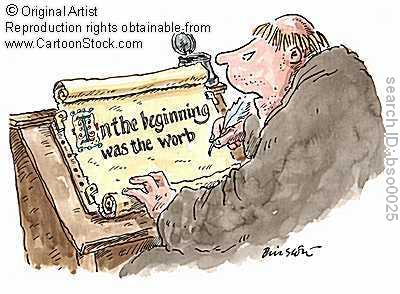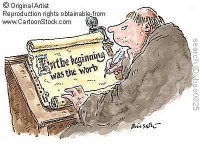Now that I have summarized what I was taught in Bible College and Seminary about the inerrancy of Scripture (Inerrancy 1, Inerrancy 2, Inerrancy 3, Inerrancy 4), let me turn to asking the questions about inerrancy that I had neither the time nor the courage to ask while I was in seminary.
Let’s with this statement:
The Bible is not inerrant. It does contain errors.
Before you call me a heretic, let me say that I pulled that statement right out of my Bible College class notes. And I didn’t go to some liberal college either. Moody Bible Institute is about as conservative as you can get. The year I started there, they finally decided to let females wear pants to class.
Is the Bible Inerrant?
So what did my Professor mean when he said that? He meant, as is universally known and accepted, that the Greek and Hebrew texts of the Bible are copies of ancient manuscripts, and these copies have textual errors which have crept in over the course of time. Not all the copies are in full agreement with each other. Therefore, the Bible has errors.

The traditional doctrine of inerrancy, like the traditional doctrine of inspiration, applies only to the original manuscripts. As I indicated yesterday, Bible scholars use textual criticism in an attempt to determine what the original manuscripts actually said.
Why Do We Need Inerrancy?
So here is my first question: If inerrancy only applies to the original manuscripts, and we no longer have these manuscripts, and the manuscripts we have contain errors, why do we need the doctrine of inerrancy? It doesn’t exactly apply to what we have today anyway.
But even if we did have the original manuscripts, or even if we could be absolutely certain that what we have today is 100% accurate to what was origionally written, would this help us at all?
I will try to look at these questions about inerrancy in the next couple days, but for now, what do you think? Do we need an inerrant Bible? If we had one, would it help us any more than what we have now?




The mss we have do not exactly agree with each other, so obviously changes (or “errors”) have crept into those mss.
Am I correct in saying that some of the differences can be attributed to simple copying errors, while others seem to be “corrections” and even inclusions into the text of notes made in the margins of earlier mss? Is it not entirely conceivable that entire sentences and probably even entire stories were added or even deleted in later mss?
We’re human. This kind of stuff is normal. It does not create problems for me. I do not need an “inerrant” Bible. Even if someone found the all autographs sealed in some clay jars in a cave and they were in perfect condition, I doubt that they would differ significantly from what we already have. Even if we found that some stuff has been changed, that would not change my faith. My relationship is with the Living Word, Jesus, not with writings.
Sam,
You are right about the “corrections.” It is tough to say whether the copiests were correcting were what they thought were mistakes in the originals, or if they were correcting errors they themselves made while copying.
The Bible contains errors only if you think man wrote it and not God using men to write what He wanted written and God also PRESERVED his WORD for all eternity. Having graduated from Moody BIble Institute in the “old days” when this was taught and believed by most of the faculty anyhow; I still believe I have an inerrant Bible today. If God cannot preserve his Written Word, do we even have a God who created this world that we live in today?
Don,
I believe in inerrancy as well, just with some slight twists that are normally not discussed or taught in some circles.
The quote from my Moody Bible Institute class notes was from a class by one of the “Old Guard.” He was 80 years old or so when he taught the class. But anyway, as you well know from studying at Moody, context is important, and that quote from my class must be understood in context, which I try to explain further in the other posts in this series.